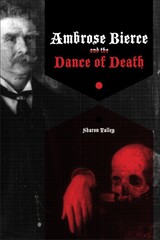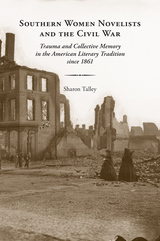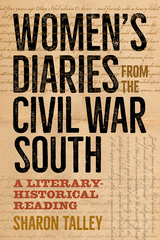
Ambrose Bierce and the Dance of Death uses psychoanalytic theory in combination with historical, cultural, and literary contexts to examine the complex motif of death in a full range of Bierce’s writings. Scholarly interest in Bierce, whose work has long been undervalued, has grown significantly in recent years. This new book contributes to the ongoing reassessment by providing new contexts for joining the texts in his canon in meaningful ways.
Previous attempts to consider Bierce from a psychological perspective have been superficial, often reductive Freudian readings of individual stories such as “An Occurrence at Owl Creek Bridge” and “The Death of Halpin Frayser.” This new volume not only updates these interpretations with insights from post-Freudian theorists but uses contemporary death theory as a framework to analyze the sources and expressions of Bierce’s attitudes about death and dying. This approach makes it possible to discern links among texts that resolve some of the still puzzling ambiguities that have—until now—precluded a fuller understanding of both the man and his writings.
Lively and engaging, Ambrose Bierce and the Dance of Death adds valuable new insights not only to the study of Bierce but to that of nineteenth-century American literature in general.

evolving collective memory by penning journals and diaries, historical accounts, memoirs,
and literary interpretations of the war. While a few of these writings—most notably Mary
Chesnut’s diaries and Margaret Mitchell’s novel, Gone with the Wind—have been studied in
depth by numerous scholars, until now there has been no comprehensive examination of
Civil War novels by southern women. In this welcome study, Sharon Talley explores works
by fifteen such writers, illuminating the role that southern women played in fashioning
cultural identity in the region.
Beginning with Augusta Jane Evans’s Macaria and Sallie Rochester Ford’s Raids and
Romance of Morgan and His Men, which were published as the war still raged, Talley offers
a chronological consideration of the novels with informative introductions for each time
period. She examines Reconstruction works by Marion Harland, Mary Ann Cruse, and
Rebecca Harding Davis, novels of the “Redeemed” South and the turn of the century by
Mary Noailles Murfree, Ellen Glasgow, and Mary Johnston, and narratives by Evelyn Scott,
Margaret Mitchell, and Caroline Gordon from the Modern period that spanned the two
World Wars. Analysis of Margaret Walker’s Jubilee (1966), the first critically acclaimed Civil
War novel by an African American woman of the South, as well as other post–World War
II works by Kaye Gibbons, Josephine Humphreys, and Alice Randall, offers a fitting conclusion
to Talley’s study by addressing the inaccuracies in the romantic myth of the Old South
that Gone with the Wind most famously engraved on the nation’s consciousness.
Informed by feminist, poststructural, and cultural studies theory, Talley’s close readings
of these various novels ultimately refute the notion of a monolithic interpretation of
the Civil War, presenting instead unique and diverse approaches to balancing “fact” and
“fiction” in the long period of artistic production concerning this singular traumatic event
in American history.
Sharon Talley, professor of English at Texas A&M University–Corpus Christi, is the author
of Ambrose Bierce and the Dance of Death and Student Companion to Herman Melville. Her
articles have appeared in American Imago, Journal of Men’s Studies, and Nineteenth-Century
Prose.

“Traditionally, narratives of war have been male,” Sharon Talley writes. In the pages that follow, she goes on to disrupt this tradition, offering close readings and comparative studies of fourteen women’s diaries from the Civil War era that illuminate women’s experiences in the Confederacy during the war.
While other works highlighting individual diaries exist—and Talley notes that there has been a virtual explosion of published primary sources by women in recent years—this is the first effort of comprehensive synthesis of women’s Civil War diaries to attempt to characterize them as a distinct genre. Deeply informed by autobiographical theory, as well as literary and social history, Talley’s presentation of multiple diaries from women of differing backgrounds illuminates complexities and disparities across female wartime experiences rather than perpetuating overgeneralizations gleaned from a single diary or
preconceived ideas about what these diaries contain.
To facilitate this comparative approach, Talley divides her study into six sections that are organized by location, vocation, and purpose: diaries of elite planter women; diaries of women on the Texas frontier; diaries of women on the Confederate border; diaries of espionage by women in the South; diaries of women nurses near the battlefront; and diaries of women missionaries in the Port Royal Experiment. When read together, these writings illustrate that the female experience in the Civil War South was not one but many.
Women’s Diaries from the Civil War South: A Literary-Historical Reading is an essential text for scholars in women’s studies, autobiography studies, and Civil War studies alike, presenting an in-depth and multifaceted look at how the Civil War reshaped women’s lives in the South—and how their diverse responses shaped the course of the war in return.
READERS
Browse our collection.
PUBLISHERS
See BiblioVault's publisher services.
STUDENT SERVICES
Files for college accessibility offices.
UChicago Accessibility Resources
home | accessibility | search | about | contact us
BiblioVault ® 2001 - 2024
The University of Chicago Press









